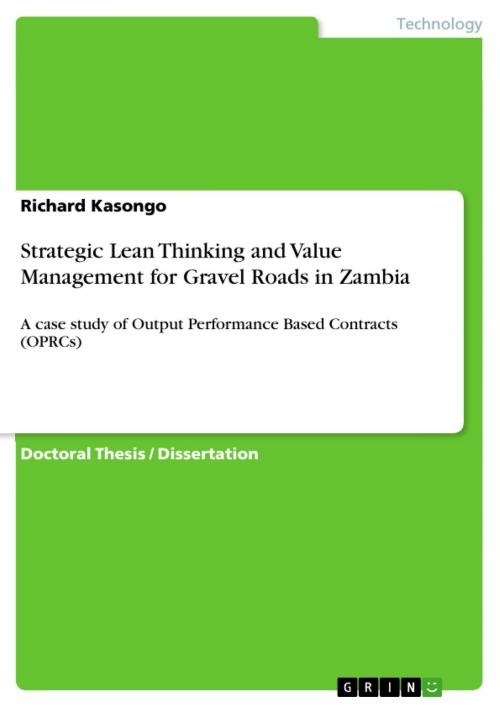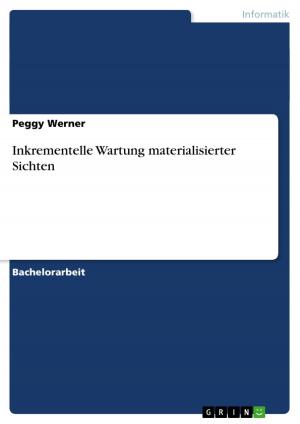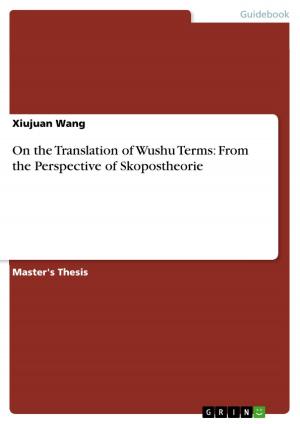Strategic Lean Thinking and Value Management for Gravel Roads in Zambia
A case study of Output Performance Based Contracts (OPRCs)
Nonfiction, Science & Nature, Technology| Author: | Richard Kasongo | ISBN: | 9783668094918 |
| Publisher: | GRIN Verlag | Publication: | November 25, 2015 |
| Imprint: | GRIN Verlag | Language: | English |
| Author: | Richard Kasongo |
| ISBN: | 9783668094918 |
| Publisher: | GRIN Verlag |
| Publication: | November 25, 2015 |
| Imprint: | GRIN Verlag |
| Language: | English |
Doctoral Thesis / Dissertation from the year 2015 in the subject Engineering - General, Basics, , course: Civil Engineering Management (Construction Project Management), language: English, abstract: This research topic is entitled 'Strategic Lean Thinking and Value Management for Gravel Roads'. The study captured 82 respondents as research sample to a case study of Output Performance - Based Contracts (OPRCs) for the Construction and Maintenance of Gravel Roads in Zambia. Purposive sampling was used as most research participants were drawn from second generation OPRCs that were active between 2009 and 2014. The study was aimed at devising new Construction and Maintenance Contract methods for gravel roads that are based on 'Lean Thinking and Value Management' philosophies in Zambia. The established epistemological background to the study is that most of the Zambian road network is of gravel or earth standards and is therefore, imperative that they are well maintained to attain desired service levels to properly serve the intended beneficiaries (the road users). The Road Development Agency Annual Report of 2009 indicated that 33,000 Km of the total 40,671 Km core road network, is classified as gravel roads (unpaved) , which are at the moment mostly in a deteriorated state. The study revealed that currently in Zambia, Gravel Road Construction projects are commonly being realised through the use of traditional Contracts such as admeasured; by the use of Bills of Quantities (BOQs), the Lump sum and Cost plus, etc. These are mainly short term form of Contracts which to some extent, lack some components of sustainable maintenance regimes, thereby rendering the Government and other Promoters efforts futile as gravel roads sooner or later deteriorate just after the first rain season upon their construction. This was theoretical perspective which served as driver to the 'Research problem'. The study noted that current forms of Contracts did not inspire, aspire and spur the spirit of ownership as the local people were left out in the planning and design stages of gravel road projects. Despite all the attempts made by Government, through the RDA and other implementing Agencies, the Road Construction Industry in general, has failed to get the best value for money through the use of these conventional types of Contracts. One of the reasons for this failure according to Womack and Jones (2003), 'is that it is hard to define and realise value, this is partly because most Producers [Road Contractors] want to make what they are already making and partly because Customers only know some variant of what they are already getting'.
Doctoral Thesis / Dissertation from the year 2015 in the subject Engineering - General, Basics, , course: Civil Engineering Management (Construction Project Management), language: English, abstract: This research topic is entitled 'Strategic Lean Thinking and Value Management for Gravel Roads'. The study captured 82 respondents as research sample to a case study of Output Performance - Based Contracts (OPRCs) for the Construction and Maintenance of Gravel Roads in Zambia. Purposive sampling was used as most research participants were drawn from second generation OPRCs that were active between 2009 and 2014. The study was aimed at devising new Construction and Maintenance Contract methods for gravel roads that are based on 'Lean Thinking and Value Management' philosophies in Zambia. The established epistemological background to the study is that most of the Zambian road network is of gravel or earth standards and is therefore, imperative that they are well maintained to attain desired service levels to properly serve the intended beneficiaries (the road users). The Road Development Agency Annual Report of 2009 indicated that 33,000 Km of the total 40,671 Km core road network, is classified as gravel roads (unpaved) , which are at the moment mostly in a deteriorated state. The study revealed that currently in Zambia, Gravel Road Construction projects are commonly being realised through the use of traditional Contracts such as admeasured; by the use of Bills of Quantities (BOQs), the Lump sum and Cost plus, etc. These are mainly short term form of Contracts which to some extent, lack some components of sustainable maintenance regimes, thereby rendering the Government and other Promoters efforts futile as gravel roads sooner or later deteriorate just after the first rain season upon their construction. This was theoretical perspective which served as driver to the 'Research problem'. The study noted that current forms of Contracts did not inspire, aspire and spur the spirit of ownership as the local people were left out in the planning and design stages of gravel road projects. Despite all the attempts made by Government, through the RDA and other implementing Agencies, the Road Construction Industry in general, has failed to get the best value for money through the use of these conventional types of Contracts. One of the reasons for this failure according to Womack and Jones (2003), 'is that it is hard to define and realise value, this is partly because most Producers [Road Contractors] want to make what they are already making and partly because Customers only know some variant of what they are already getting'.















